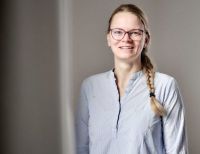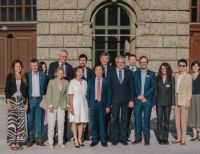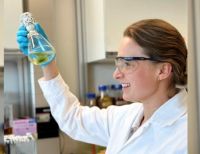They can enjoy an experience their predecessors missed out on: commencing their studies on the ETH campus. Some 4,300 bachelor’s and master’s students (forecast) are due to start their course at ETH. “The return to lecture halls is long overdue,” stresses ETH Rector Sarah Springman. Studying involves much more than simply learning facts. “It’s just as important to make new contacts and connect in study groups,” Springman explains.
Strong demand for engineering sciences – biochemistry booming
Out of a total 3,325 new Bachelor’s students, compared with 3,396 last year, Engineering Sciences is still in great demand, with 1,224 admissions (+2%). Other popular courses are Mechanical Engineering with 519 new students (+2.6%) and Computer Science with 428 (+4.1%). While the numbers for the smaller degree programmes tend to fluctuate from year to year, the decline of 17% for Environmental Sciences (158 admissions) and 14% for Health Sciences and Technology (239 admissions) is quite astonishing, especially considering current social trends. Biochemistry – a course that was only offered for the first time in the Autumn Semester 2020 – is experiencing a real boom, with numbers up from 27 to 68 admissions.
The number of new students entering Bachelor’s courses without a Swiss Matura qualification has risen from 471 in 2020 to around 600 this year.
Number of Master’s students hard to estimate
As always, the exact number of Master’s students is only known after the semester commences, once ETH undergraduates transfer from Bachelor’s to Master’s degree programmes. The number of Master’s applications from international students has risen sharply and the current level of enrolments is much higher, at around 1,000, compared with 774 new entrants with international BSc degrees last year.
European exchange students close to a record high
In addition to these new students, ETH Zurich is pleased to welcome some 400 exchange and visiting students in the Autumn Semester 2021, roughly the same number as in 2019. Exchanges with universities outside of Europe were put on hold last year, which resulted in a reduction to around 270 visiting students. This year’s recovery is mostly down to a large increase in European exchange students. While the number of exchange students from North America is only gradually returning to normal, exchanges with Asian universities are still almost totally suspended. The most common countries of origin (apart from Switzerland) this year are Germany, Sweden, the Netherlands, the UK, Italy and Denmark (in that order).
COVID certificates required in the classroom – online teaching still available
Introducing mandatory COVID certificates for anyone attending in-person teaching events allows ETH to operate classrooms and lecture halls at full capacity. This is the only way of providing a more or less normal study experience after nearly three semesters of operating in ‘emergency mode’. In addition, the mandatory wearing of face masks in lectures provides an extra level of protection for both students and lecturers. Wherever possible, teaching sessions will also be available online for those unable or unwilling to attend in person.
Vaccination certificates from EU and EFTA countries are also valid in Switzerland. Anyone who has been fully vaccinated in another country with a vaccine approved in Switzerland can apply for a certificate from the Canton of Zurich or the canton where they live. In addition, all Swiss and international certificates and proof of vaccination will be recognised as long as the vaccine meets the criteria defined by the Federal Office for Public Health (FOPH) for exemption to the applicable health-related measures at the border. These also include the Chinese vaccines Sinopharm and Sinovac.
















